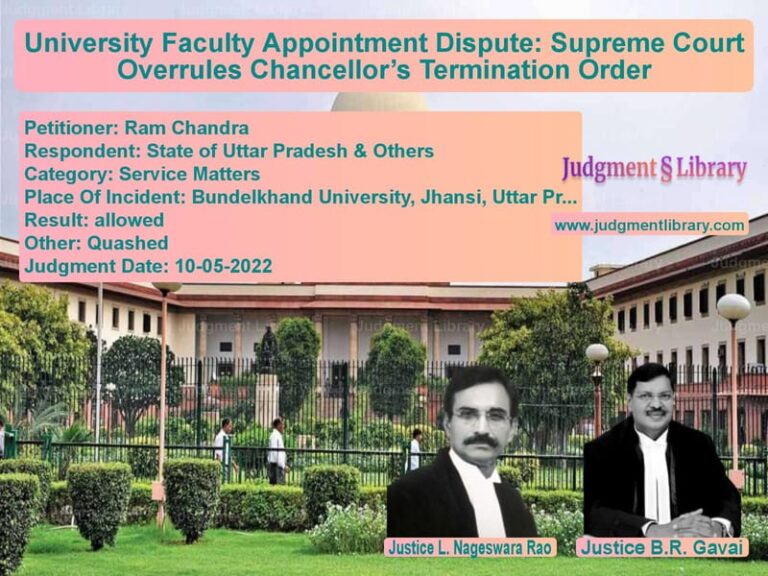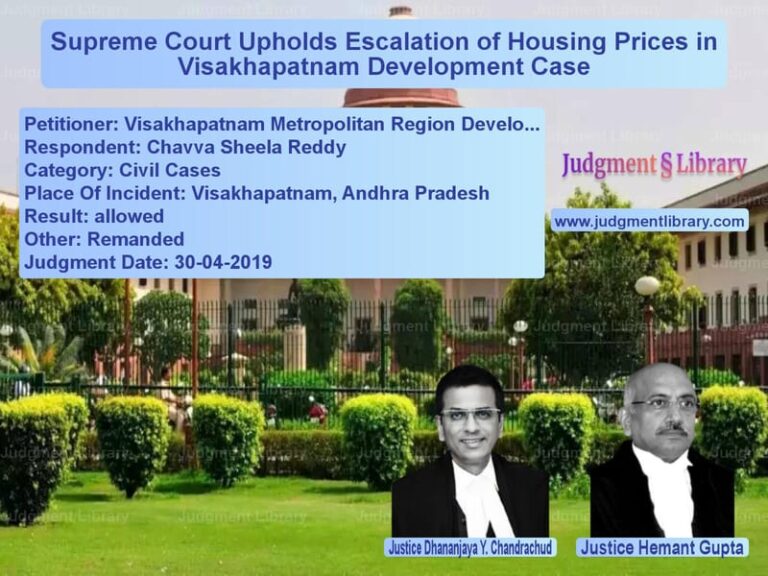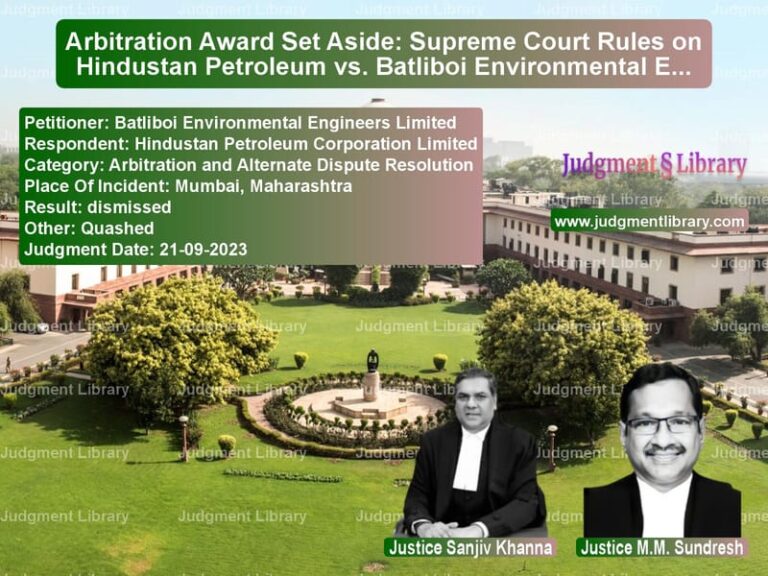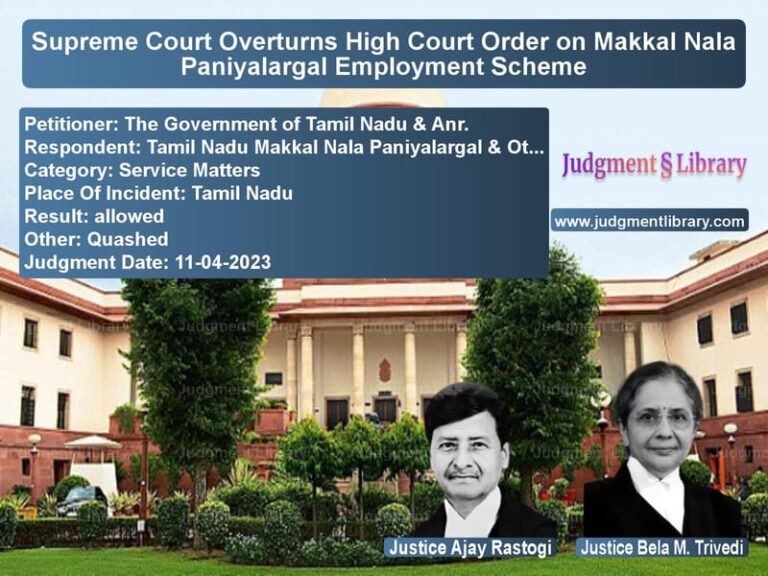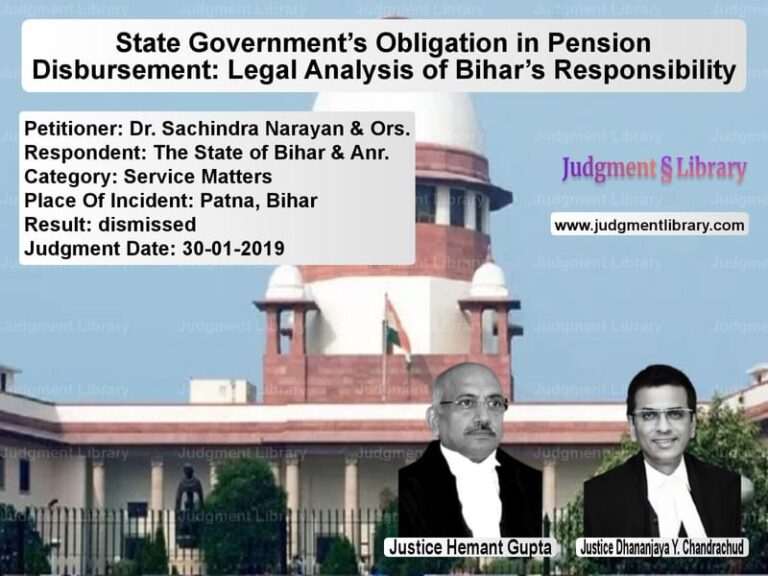Supreme Court Quashes High Court’s Dismissal, Revives Sanjay Kumar’s Appeal
The Supreme Court of India, in its judgment dated February 27, 2025, delivered a significant ruling quashing the dismissal of an appeal by the High Court and reviving the case for a fresh hearing. This case revolves around the murder of Ishwar Chander during a robbery, leading to criminal proceedings against the accused, including respondent No. 5, Megnath Koiri. The appellant, Sanjay Kumar, had sought justice for his father’s murder but faced an early dismissal of his appeal by the High Court, which did not call for trial court records.
Background of the Case
The case concerns a robbery in which three intruders stormed into a shop and shot the informant’s father, Ishwar Chander, who succumbed to his injuries. One of the intruders, respondent No. 5, Megnath Koiri, was detained at the crime scene after sustaining injuries. The prosecution’s case rested heavily on eyewitness accounts, including that of the appellant himself.
Despite the presence of critical evidence and testimonies, the High Court summarily dismissed the appeal on its very first day, without even reviewing the records of the trial court. The appellant challenged this decision before the Supreme Court, arguing that such an outright dismissal had deprived him of his right to a fair hearing.
Arguments Presented by the Petitioner
The learned counsel for the appellant, Sanjay Kumar, presented a series of arguments highlighting the errors in the High Court’s ruling. He stated:
“The High Court dismissed the appeal without examining the records of the trial court. This is a gross miscarriage of justice.”
He pointed out that the High Court failed to consider critical evidence, including depositions from key witnesses:
- PW-8 (Sanjay Kumar): The appellant himself, who was an eyewitness to the crime.
- PW-7 (Kalam): Another eyewitness present at the scene.
- PW-6 (Dinesh Prasad): Declared hostile, but his cross-examination by the prosecutor contained important evidence.
- PW-10 (Krishna Chandra Dubey): The investigating officer whose testimony confirmed the events.
The appellant’s counsel emphasized that respondent No. 5, Megnath Koiri, was caught at the scene of the crime, yet the High Court overlooked this fact:
“There is no doubt that the accused was apprehended at the spot. The delay in trial may have impacted witness memory, but the fact remains that the accused was caught red-handed.”
Arguments Presented by the Respondent
The State of Bihar, representing the respondents, defended the High Court’s ruling and argued that the appeal was rightly dismissed. Their key arguments included:
1. The appellant’s testimony was inconsistent with the statements of other staff members present at the crime scene.
2. The High Court found that respondent No. 5 had been acquitted under the Arms Act, 1959, which weakened the prosecution’s case.
3. The ballistic report of the weapon allegedly recovered from respondent No. 5 was never produced in court, raising doubts about its evidentiary value.
The respondent’s counsel argued:
“The acquittal under the Arms Act and the lack of forensic evidence render the appeal weak. The High Court acted well within its jurisdiction in dismissing it.”
Supreme Court’s Observations and Judgment
The Supreme Court examined the case thoroughly and found multiple flaws in the High Court’s decision. It observed:
“An appeal cannot be dismissed at the outset without calling for trial court records. The High Court has failed to exercise its duty properly.”
Additionally, the Court addressed the issue of the Arms Act acquittal:
“Acquittal in a separate trial does not negate the evidence in the present case. Each case must be judged on its own merit.”
Sections 40 to 44 of the Indian Evidence Act, 1872, were cited to emphasize that prior judgments must be analyzed with caution and cannot be taken as conclusive proof in unrelated proceedings.
The Supreme Court then quashed the High Court’s dismissal, stating:
“The impugned order dated 03.07.2013 is set aside. Criminal Appeal (DB) No. 573/2013 shall stand revived before the High Court for a fresh hearing.”
The Court further directed that the appeal be heard and decided on its merits:
“The High Court shall issue notice and decide the appeal in accordance with law, ensuring that all material evidence is considered.”
Impact of the Judgment
This ruling has broader implications for judicial fairness in criminal appeals. It underscores the Supreme Court’s commitment to due process and ensures that High Courts cannot summarily dismiss cases without proper evaluation.
Furthermore, by reviving the appeal, the Court has restored the petitioner’s right to seek justice for his father’s murder.
Conclusion
The Supreme Court’s judgment in this case serves as a crucial precedent in criminal appellate jurisprudence. It affirms the principle that all appeals must be heard on their merits and that courts must not dismiss cases prematurely.
With the appeal reinstated, the High Court must now conduct a full review of the evidence and deliver a judgment based on the merits of the case. This ruling reinforces the principle that justice must not only be done but must also be seen to be done.
Petitioner Name: Sanjay Kumar.Respondent Name: State of Bihar & Others.Judgment By: Justice Sanjiv Khanna, Justice Sanjay Kumar.Place Of Incident: Bihar.Judgment Date: 27-02-2025.
Don’t miss out on the full details! Download the complete judgment in PDF format below and gain valuable insights instantly!
Download Judgment: sanjay-kumar-vs-state-of-bihar-&-oth-supreme-court-of-india-judgment-dated-27-02-2025.pdf
Directly Download Judgment: Directly download this Judgment
See all petitions in Bail and Anticipatory Bail
See all petitions in Fraud and Forgery
See all petitions in Attempt to Murder Cases
See all petitions in Custodial Deaths and Police Misconduct
See all petitions in Judgment by Sanjiv Khanna
See all petitions in Judgment by Sanjay Kumar
See all petitions in allowed
See all petitions in Quashed
See all petitions in supreme court of India judgments February 2025
See all petitions in 2025 judgments
See all posts in Criminal Cases Category
See all allowed petitions in Criminal Cases Category
See all Dismissed petitions in Criminal Cases Category
See all partially allowed petitions in Criminal Cases Category


